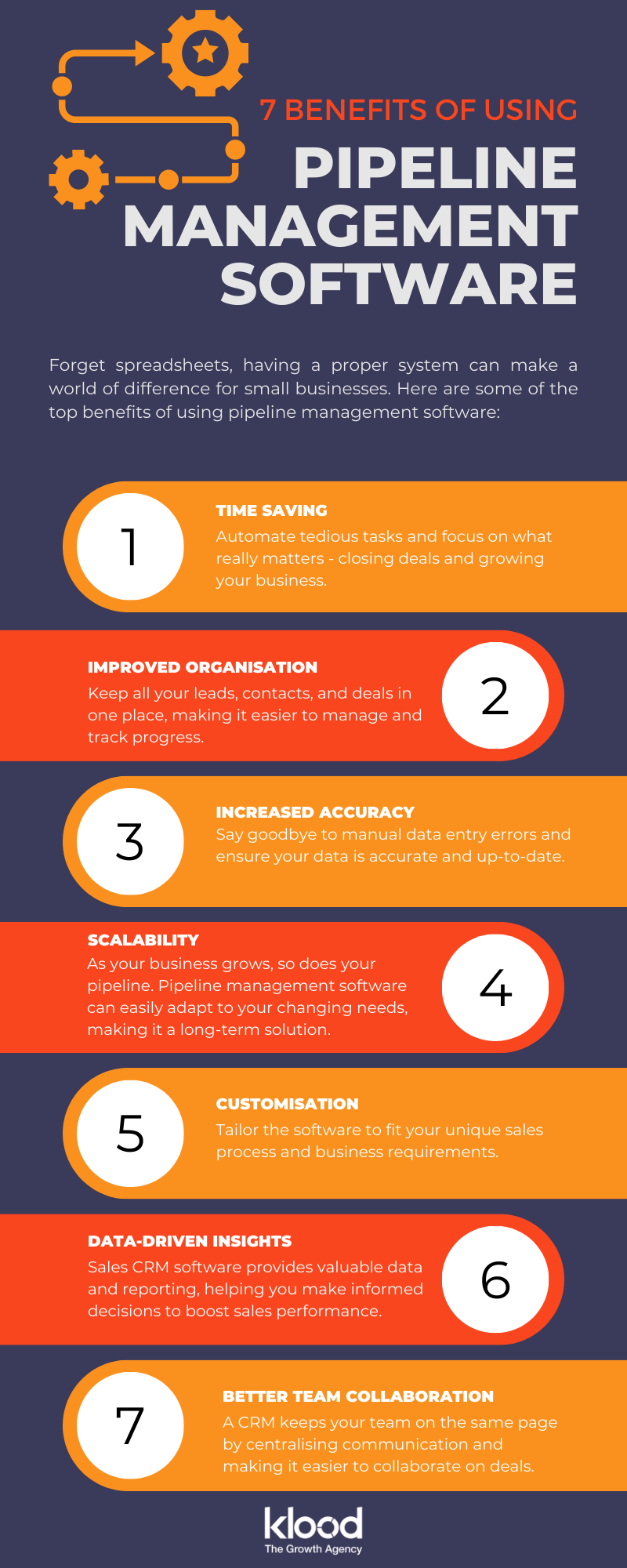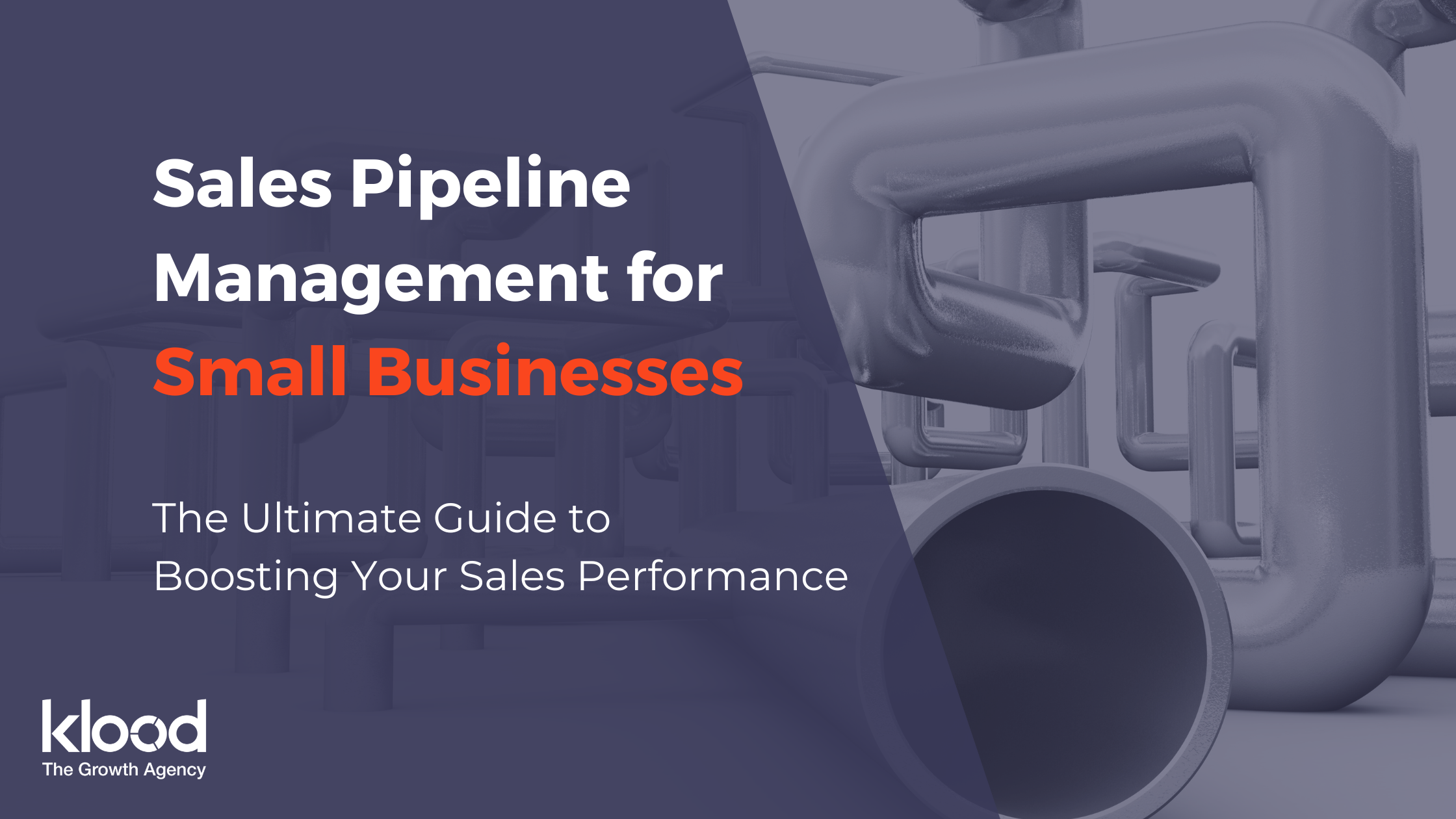Table of Contents
-
Introduction to Sales Pipeline Management for Small Businesses
- Benefits of using pipeline management software
- Key Features of Pipeline Management Software
Introduction to Pipeline Management for Small Business Owners
As a small business owner, you know that juggling leads, prospects, and clients can be quite challenging, especially when you're managing the sales pipeline yourself or with a small team.
.png?width=1000&height=500&name=Untitled%20design%20(8).png)
That's where deal management comes in handy. It's your key to organising, monitoring, and nurturing those leads as they move through your sales funnel. By mastering this, you can close deals faster, more efficiently, and grow your business like never before.
Ready to unlock the full potential of your sales pipeline? Let's dive in!
The Importance of a Sales Pipeline in CRM
So, you might be wondering, "Why is a sales pipeline so important in CRM?" Great question! Let me explain.
A sales pipeline is like the backbone of your sales CRM platform or system.
It gives you a clear, visual representation of where your leads and sales deals are in the pipeline —— it's about understanding your sales journey from start to finish.
By incorporating a sales pipeline into your CRM, you're able to prioritise leads and know which ones are worth pursuing. You can monitor the progress of each deal as it moves through the pipeline, knowing when to take action or offer support to help close the deal. Not only that, but a well-maintained pipeline can help you predict future sales and revenue, making it easier to plan for growth and allocate resources.
If you have a sales team, a shared pipeline ensures everyone's on the same page, making for a more collaborative and effective process. Plus, with a sales pipeline integrated into your CRM, you can identify bottlenecks in your process and take action to improve it, ultimately leading to accurate sales forecasts, more closed deals and business growth.
Benefits of Using Pipeline Management Software

The bottom line? Investing in pipeline management software is a smart move for small business owners who want to optimise their sales funnel, save time, and drive revenue growth. It's a no-brainer, really!
11 Ways to Manage Your Sales Pipeline
1. Improve and Standardise the Sales Process
Map out each stage of the sales funnel and define the actions required. This will help you to set realistic goals and develop a clear, consistent sales system that everyone on your team can follow. A standardised sales process is one that's easier to continuously monitor and refine based on feedback, data, and industry best practices. Ultimately, you end up with a uniform approach to managing leads and closing deals.
2. Focus on the Best Leads
Identify your ideal customers and prioritise prospects that fit the bill. Score leads based on their likelihood to convert and invest time in nurturing high-potential leads.
3. Drop Dead Leads
Recognise when to let go of dead leads to save time and resources. Look for lack of engagement, no clear interest, or unwillingness to commit as indicators that it's time to move on.
4. Analyse Your Sales Strategy
Regularly review your sales strategy to identify strengths, weaknesses, and opportunities for improvement. Adjust your tactics based on data and insights to drive better results.
5. Review Sales Team Performance Regularly
Monitor your sales team's performance, providing feedback and support to help them improve. Celebrate wins and learn from losses to foster a culture of growth and development for sales professionals.
6. Monitor Pipeline Metrics
Keep an eye on key pipeline metrics like conversion rates, deal velocity, and lead ageing. Use these insights to optimise your process and make data-driven decisions.
7. Review and Improve Your Pipeline Processes
Continuously evaluate and update your pipeline processes to ensure they're efficient and effective. Look for bottlenecks, inefficiencies, or areas where leads tend to drop off.
8. Develop Sales Reps' Skills
Invest in your sales team's development through training, coaching, and mentorship. Help them hone their skills and become better salespeople.
9. Use a CRM to Manage Your Sales
Leverage CRM software to organise, track, and nurture leads throughout the sales journey. This not only streamlines your pipeline management but also enhances collaboration and customer relationships.
10. Track and Optimise Conversion Rates
Monitor your conversion rates at each stage of the pipeline and identify areas for improvement. Adjust your tactics and approach to boost conversions and close more deals.
11. Collaborate and Share Best Practices
Encourage your sales team to collaborate and share their best practices, tips, and experiences. Learning from one another can lead to better overall sales performance and a stronger team.
Do You Need a Tool to Manage Your Sales Pipeline?
If you want to take your sales teams' performance to the next level, a sales pipeline tool is a wise investment. It can save you time, streamline your sales approach, and help your team close more deals. Don't settle for mediocrity—equip your sales reps with the tools they need to become elite sellers.

Key Features of Sales Pipeline Software
When selecting the best sales software, it's crucial to spend some time looking at the features and seeing if they fit the way your business works. Here are some essential features to consider:
1. Easy-to-use interface
An intuitive, user-friendly interface is vital for ensuring a smooth experience for your sales reps. The easier the software is to navigate and understand, the more likely your team will adopt and use it effectively.
2. Customisable pipeline stages
Every business has a unique sales model. Look for software that allows you to customise pipeline stages to align with your specific process, ensuring a seamless fit with your existing workflow.
3. Lead scoring and prioritisation
The ability to score and prioritise leads based on their likelihood to convert can significantly impact your sales efficiency. Choose software that enables lead scoring and prioritisation, helping your team focus on the most promising sales opportunities first.
4. Task management and automation
Managing tasks and automating routine processes can save your sales team valuable time. Opt for software with robust task management features and automation capabilities to streamline your sales operation.
5. Real-time reporting and analytics
Having access to real-time reporting and analytics can provide valuable insights into your sales pipeline's health. Look for software with comprehensive reporting features, allowing you to make data-driven decisions and optimise your sales strategy.
6. Integration with your CRM and other tools
A sales pipeline software that seamlessly integrates with your existing CRM platform and other business tools can significantly enhance your team's productivity. Choose a solution that offers smooth integration to minimise disruptions and maintain a cohesive tech stack.
7. Scalability to grow with your business
As your business grows, your sales pipeline software should be able to adapt and scale accordingly. Select a solution that can accommodate your changing needs, ensuring it remains a valuable asset for your company as it evolves.
By considering these key features, you'll be well-equipped to choose the ideal sales pipeline software for your business, ultimately empowering your own sales teams manage their reps and driving success.
Sales Pipeline Software Products
There are numerous sales pipeline management software options on the market, each offering unique features and capabilities. Some popular choices include:
-
Pipedrive
-
HubSpot Sales Hub
-
Keap
-
Salesforce Sales Cloud
-
Zoho CRM
-
Freshsales
-
Insightly
-
Close
-
Copper
-
Sales Pipeline Management for Different Roles
.png?width=1000&height=500&name=Copy%20of%20BLOG%20GRAPHIC%20(1).png)
-
Sales Managers' Perspective
Pipeline management plays a crucial role in the success of sales managers. They are responsible for overseeing the entire sales journey, which includes setting goals, tracking team performance, and ensuring that deals progress smoothly through the pipeline. Here are some key aspects of pipeline management from a sales manager's perspective:
-
Goal setting: Establishing clear, realistic objectives for the sales team to achieve.
-
Performance monitoring: Regularly reviewing the team's progress and providing feedback, coaching, and support to help them improve.
-
Pipeline analysis: Identifying bottlenecks, inefficiencies, or areas where leads tend to drop off, and taking action to address these issues.
-
Resource allocation: Ensuring that the team has the necessary tools, training, and support to succeed.
Sales Reps' Perspective
For sales reps, effective pipeline management is essential for staying organised, prioritising leads, and ultimately, closing deals. Here's what pipeline management means for sales reps:
-
Lead prioritisation: Identifying and focusing on the most promising leads to maximise the chances of conversion.
-
Task management: Keeping track of tasks, appointments, and follow-ups to ensure that no opportunities are missed.
-
Collaboration: Working with team members to share best practices, tips, and experiences, fostering a supportive sales environment.
-
Continuous improvement: Learning from both successes and failures to hone skills and become a better salesperson.
Multiple Pipelines for Different Teams
In some cases, businesses may have different teams handling various aspects of the formal sales process or targeting different customer segments. In these situations, having multiple sales pipelines can be beneficial. Here's why:
-
Customisation: Each team can tailor their pipeline to fit its unique sales framework, ensuring that it aligns with its specific goals and objectives.
-
Organisation: Multiple pipelines allow for better organisation and visibility into each team's progress, making it easier to manage and allocate resources.
-
Performance tracking: With separate pipelines for each team, it becomes simpler to monitor and analyse the performance of individual teams and identify areas for improvement.
-
Clarity: Having distinct pipelines for different teams or customer segments can provide a clearer understanding of each team's responsibilities, ensuring that everyone is on the same page and working toward common objectives.
By understanding the role of pipeline management from various perspectives, businesses can create a more efficient and effective sales experience that benefits everyone involved.
-
-
Analyse Data for Sales Insights
.png?width=1000&height=500&name=Copy%20of%20BLOG%20GRAPHIC%20(2).png)
-
Sales Analytics and Reporting
Sales analytics and reporting play a critical role in understanding the effectiveness of your sales cycle and making informed decisions.
-
By regularly reviewing sales data, you can gain valuable insights into your sales team's performance, customer preferences, and potential areas for improvement. Some key aspects of sales analytics and reporting include:
-
Lead sources: Identifying the channels that generate the most leads and conversions, helping you focus your marketing efforts on high-performing sources.
-
Sales trends: Monitoring sales trends over time to spot patterns, anticipate fluctuations, and make proactive adjustments to your sales strategy.
-
Deal velocity: Analysing how quickly deals progress through the pipeline, enabling you to identify bottlenecks and optimise your sales process.
-
Win/loss analysis: Examining the reasons behind successful and unsuccessful deals to uncover insights that can improve your sales approach.
Key Metrics to Track
To make the most of sales analytics, it's essential to track the right metrics. Here are some key metrics to consider:
-
Lead conversion rate: The percentage of leads that ultimately convert into customers, indicating the effectiveness of your sales process.
-
Sales cycle length: The average time it takes to close a deal, which can help you identify inefficiencies in your sales process.
-
Revenue per rep: The amount of revenue generated by each sales rep, providing insights into individual performance and areas for improvement.
-
Customer acquisition cost: The average cost of acquiring a new customer, which can help you evaluate the return on investment (ROI) of your sales and marketing efforts.
How to Use Data to Improve Sales Performance
Leveraging sales data can provide actionable insights that lead to better sales performance. Here's how to use data to improve your sales process:
-
Identify opportunities: Use data to uncover trends, patterns, and untapped markets that present potential growth opportunities.
-
Optimise sales process: Analyse your sales process to identify bottlenecks, inefficiencies, or areas where leads tend to drop off, and take action to address these issues.
-
Tailor your approach: Use data to understand your customers' preferences and needs, allowing you to personalise your sales approach and improve your chances of closing deals.
-
Monitor and adjust: Continuously track your sales metrics and adjust your sales strategy based on data-driven insights to ensure ongoing improvement and success.
By analysing data and tracking key metrics, you can make informed decisions that enhance your sales performance and drive business growth.
-
Sales Pipeline Automation: Enhance Efficiency and Drive Results
.png?width=1000&height=500&name=Copy%20of%20BLOG%20GRAPHIC%20(3).png)
Sales pipeline automation is the process of using technology to streamline and optimise various aspects of the sales pipeline. By automating repetitive tasks and simplifying the sales process, businesses can save time, reduce errors, and focus on what truly matters—building relationships and closing deals.
Benefits of Sales Pipeline Automation
Implementing sales automation and pipeline automation can have numerous advantages, such as:
-
Increased productivity: Automation frees up time for sales team to concentrate on high-value activities like engaging with prospects and closing deals.
-
Improved accuracy: Automated systems minimise human error, ensuring that data is consistently accurate and up-to-date.
-
Enhanced consistency: Automation ensures that each step of the sales process is executed uniformly, fostering a seamless and professional customer experience.
-
Data-driven insights: Automated systems can provide real-time analytics and reporting, enabling businesses to make informed decisions and optimise their sales strategies.
-
Scalability: As your business grows, automation can help manage increased workloads and maintain a high level of efficiency.
Examples of Sales Pipeline Automation
Here are some examples of tasks sales activities and processes that can be automated within the sales pipeline:
-
Lead assignment: Automatically assign leads to reps based on predefined criteria, such as geographical location, expertise, or workload.
-
Lead scoring: Implement an automated lead scoring system that prioritises leads based on their likelihood to convert, helping reps focus on the most promising opportunities.
-
Task management: Automatically create and assign tasks, such as follow-up calls or emails, based on specific triggers or milestones within the sales process.
-
Email templates and sequences: Utilise pre-built email templates and automated email sequences to streamline communication with leads, ensuring consistent messaging and timely follow-ups.
-
Meeting scheduling: Integrate scheduling tools with your CRM software to simplify booking appointments and reduce the back-and-forth involved in coordinating meetings.
-
Pipeline updates: Automatically update the pipeline stages for leads as they progress through the sales process, keeping your CRM accurate and up-to-date.
-
Alerts and notifications: Set up automated alerts and notifications to remind deal owners of upcoming tasks, deadlines, or notable changes in lead status.
By embracing sales pipeline sales and marketing automation now, businesses can save time, improve efficiency, and ultimately, boost their sales performance. Investing in the right tools and technology can transform your sales process and set your business on the path to success.
Key Takeaways
The Role of Pipeline Management in Business Growth
Sales pipeline management plays a crucial role in driving business growth. By efficiently managing and optimising the sales process, businesses can close more deals, generate more revenue, and ultimately, fuel their expansion.
The Value of a Well-Managed Sales Pipeline
A well-managed sales pipeline allows businesses to:
-
Prioritise leads and focus on high-value opportunities
-
Optimise their sales process to improve deal velocity and conversion rates
-
Monitor sales performance and make data-driven decisions
-
Foster collaboration and skill development among your team
How Effective Pipeline Management Contributes to Sales Success
Effective pipeline management is essential for sales success. By streamlining the sales process, prioritising leads, and continuously refining the sales approach, businesses can close more deals and boost sales performance.
Conclusion
The Future of Sales Pipeline Management
As technology continues to advance and the sales landscape evolves, sales pipeline management will become even more critical to business success. Companies that embrace new tools, such as artificial intelligence and machine learning, can gain a competitive edge by using sales forecasting and leveraging data-driven insights to optimize their sales process.
Embracing Technology and Best Practices for Better Sales Performance
To achieve better sales performance, businesses should embrace technology and adopt best practices in sales pipeline and customer relationship management too. By investing in the right tools, continuously refining the sales process, and fostering a culture of learning and improvement, companies can position themselves for long-term success in the competitive world of sales.
Boost Your Sales Pipeline Performance with a Review Call
Don't miss out on the opportunity to optimise your sales pipeline management and drive your business growth to new heights. Book a Sales Pipeline Review Call with our experts today. During this call, we'll analyse your existing pipeline management, recommend appropriate technology solutions, and suggest improvements that can significantly impact your sales performance.
Don't wait! Unlock the full potential of your sales process and propel your business forward. Click the link below to schedule your Sales Pipeline Review Call now and start enjoying the benefits of a well-managed sales pipeline.
Stay Updated with Our Latest Insights
Get expert HubSpot tips and integration strategies delivered to your inbox.

.jpg)

